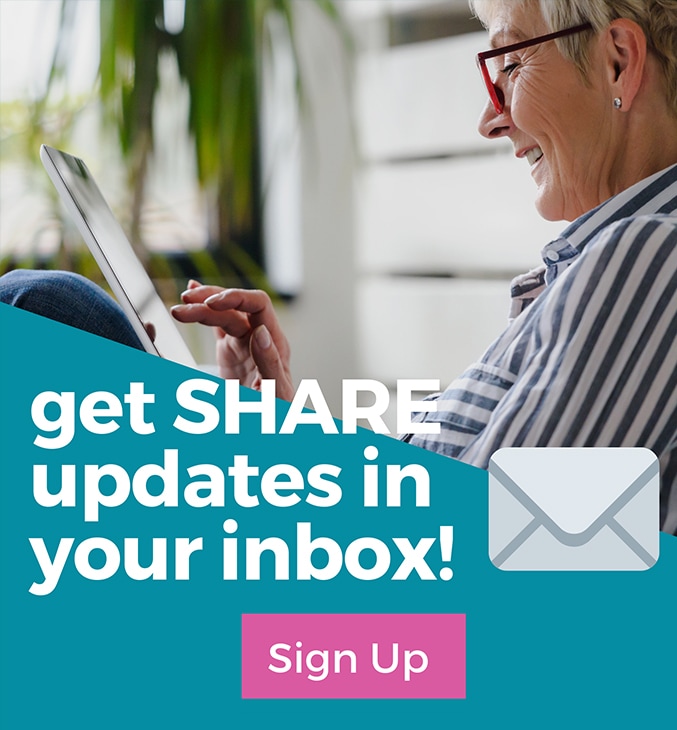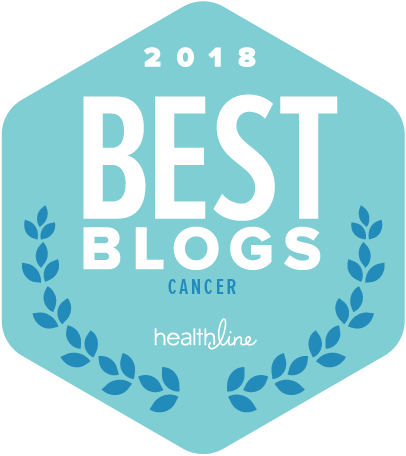Megan-Claire Chase, a breast cancer blogger at warriormegsie.com, has partnered with SHARE to discuss the five lessons she's learned from her cancer diagnosis in the blog post below.
I’m a three-year breast cancer survivor, young adult cancer survivor advocate, cancer blogger, and speaker in my spare time and a marketing project manager by day. I’m known as “Warrior Megsie” in the cancer community. I was diagnosed with ER+/PR+, HER2-, Stage IIA Invasive Lobular Breast Cancer in my left breast two months after my 39th birthday in September 2015. My journey has been and continues to be difficult. I’ve had 16 rounds of chemo, eight surgeries, blood transfusion, 33 radiation treatments and medically induced into menopause with a hysterectomy and oophorectomy, all by my 40th birthday. I did have genetic testing and discovered I have an unknown genetic variance in the MSH6 gene called p.R772Q. At this time, there is not enough information to determine if this change is associated with an increased risk for cancer or not.
Due to the trauma of my body from breast cancer and the hysterectomy/oophorectomy, I’m currently in palliative care at 43 years old for pain management due to fibromyalgia and osteoarthritis in both knees.
My body is riddled with chronic pain along with neuropathy. I do meet the requirements to apply for disability but won't because I can't afford to live on such a low monthly income and need health insurance. Surviving is expensive. I have no choice but to continue working full-time because of continuous medical bills, cost of living in a major city, and the need for health insurance. It wears on me greatly to never get the rest my body so desperately needs.
I could write a dissertation on what I’ve learned about breast cancer the past four years. Instead, I’ll focus on the top five things I’ve learned on this incredibly difficult yet rewarding journey.
- I did not realize there were so many different types of breast cancers. I truly feel the whole “Breast Cancer Awareness” movement in PINKtober has done a major disservice to the public. Before I was diagnosed, it never clicked that breast cancer was all that difficult or that you could die from it. I also didn’t realize that men can get breast cancer. Where are their resources and support? Many organizations and even cancer centers are so focused on making breast cancer “pretty.” We’ve been brainwashed into thinking it’s all about walks, pink, tutus, big smiles, older women, high-fives and laughter. It was a heavy dose of reality when I discovered how scary, painful, emotional and tough the journey would be during active treatment and after.
- I was not fully prepared for all the side effects that go with chemotherapy. Logically, I knew I would lose my hair because of the poison coursing through my body, but all the other side effects really shocked me and caused permanent damage. Most people think chemo will make you lose a significant amount of weight. I was under that assumption as well. Little did I know the steroids given before all 16 rounds of chemo would blow my weight up and completely wreck my sleep. The palms of my hands and feet literally turned black, like I had been burned. My fingernail beds lifted off and a few fell off. It was painful. Aside from losing the hair on my head, I lost my eyelashes, eyebrows, nose hair, arm hair, leg hair, underarm hair and lost the hair on my lady parts. The most difficult and damaging side effect from the chemo was getting chemo-induced peripheral neuropathy in my hands and feet. I literally felt my nerves die while on Taxol (generic name Paclitaxel). I can’t even fully verbalize what the moment felt like in the first 15 minutes of the very first Taxol treatment. As someone who used to dance and grew up performing musical theatre, not feeling my feet has been utterly devastating. Though the nerves are slowly regenerating in my hands, they are dead in my feet. I have a severe case.
- Since I was diagnosed under 40, I did not realize how difficult it would be to be find either local or online support for those in my age group. I was often the youngest person in the infusion room. I had to work during all my treatments. I’m not even close to the typical retirement age. I’ve been able to find fantastic online support for young adult cancer survivors through organizations like Lacuna Loft, Young Survivors Coalition, Stupid Cancer, IHadCancer.com and the cancer community on Twitter. Locally, it has been difficult to find that support. Aside from being “younger,” I’m also not married. Thanks to my cancer treatments and multiple surgeries, I am unable to have children. It has been hard to find others who can relate to that devastation and grief.
- I have been able to be part of some amazing events celebrating breast cancer patients and survivors. I learned there are a lot of organizations who recognize the struggles of this journey and give opportunities for patients and survivors to have a platform and share their stories. I was honored by the Atlanta Falcons in October 2016, which was one of the most exciting things to ever happen in my life. I was the story mistress for a fundraiser called Best Strokes that raises money for breast and ovarian research in March 2019. My blog has been syndicated on Cancer Health Magazine’s website because of the rawness and truth I discuss in my personal journey, helping others not feel so alone. I was interviewed on WATC-TV Channel 57 in October 2019 for a breast cancer awareness segment for young adult cancer survivors. My most exciting cancer-related accomplishment was something I never would’ve considered had it not been for breast cancer and becoming infertile: I got to present with my research partner, Francesca Music from Elon University, at the 16th Annual American Psychosocial Oncology Society (APOS) in Atlanta, GA in February 2019. Our abstract was titled“You don’t really have a say in anything…like you don’t have any options”: AYA Cancer Survivors’ Perspectives on Fertility Preservation Conversations with Healthcare Providers; it is published in the medical journal Psycho-Oncology. Francesca and I were also accepted for a Poster Symposia II: Sexual and Reproductive Health oral presentation at the annual meeting of the Society for Adolescent Health and Medicine in Washington, DC in March 2019.
- The most poignant thing I’ve learned on my breast cancer journey is that survivors’ guilt is real: I’ve felt the guilt as many of my fellow pink sisters have passed away from metastatic breast cancer. I had never experienced much death in my life. This year alone, I have lost so many local and online friends whose stories I had followed and connected with on a deeply personal level. Their deaths remind me how fleeting life after a breast cancer diagnosis can be. The reality is that many are dying from this cancer. The fear of the unknown and getting scans every six months really makes me live life with purpose and be very intentional in all I do. Not knowing if all the cancer is really gone or if some microscopic cancer cell is slowly growing and not captured on tests yet is terrifying and very real. I will never declare I am cancer-free. I always use the term No Evidence of Disease (NED) because I don’t know if the cancer is truly gone.
It's so important to arm ourselves with knowledge, get genetic testing and be our own advocates. It’s our right as patients/survivors to ask questions of our medical team and have an active voice in our care. After all, it’s our lives on the line. We matter.
Citation for the medical journal Psycho-Oncology:
Music, F., Chase, M. & Fair, C. (2019). “You don’t really have a say in anything…. like you don’t have any options”: AYA perspectives on fertility
preservation conversations with healthcare providers. Psycho-Oncology, 28 S1, 17. doi: 10.1002/pon.4986



